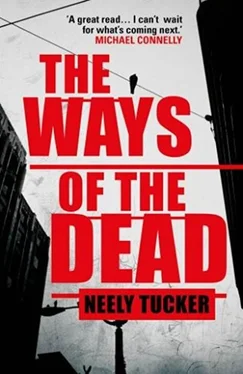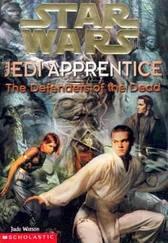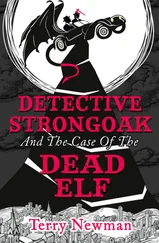The car topped the rise when he was halfway back to the grave. It slowed and stopped. Sully pulled the flowers from their plastic wrapping and set them in the little vase, and then set it back in its holder. He adjusted the flowers so that they didn’t list to one side.
“They’re beautiful,” Lorena called out.
He half turned and saw her. She was two steps out of the car, alone on the landscape, just the two of them, and the bouquet she was holding, a spray of red and white roses with carnations and baby’s breath tucked in the greenery, spread out from a light green wrapping. It was huge, something from a proper florist.
He slumped on his good leg as she came over to him. “You’re making me look bad,” he said, knowing her just well enough to put an ironic spin on it.
“Well, I didn’t know you were coming.”
“Ditto.”
She took his flowers from the vase, and mixed his in with hers, divided them into two smaller batches, and placed them in the vases on each side of the marker. She stepped back and they considered the effect. Neither of them said anything. The silence stretched out.
“You come out here a lot?” he said into the breeze, finally.
“Two or three times a week. You?”
“The holiday, you know, I guess.”
She nodded. They stood, silent again, looking at the marker and the flowers. The sky was gunmetal gray, the breeze in the limbs making a soft rustling noise, the traffic too far away to be heard.
“I don’t think I ever said thank you,” she said.
Thanks? Thanks for what? Jesus, the things people said.
“What will you do now?” he said, ignoring it. “Now that this, well, this part of it, anyway, is over.”
“I was thinking of getting away for a while,” she said. “Go back home maybe, for a week or two over Christmas. See some family. Reconnect with the old country. I don’t know.”
“Negril? It’s beautiful,” he said. “Those cliffs, the volcanic things. Stayed there one time at a place where you could jump right off the edge into the ocean.”
“The Xtabi,” she said. “Where they filmed-”
“ Papillon ,” he said.
She looked up at him and smiled. It was the first time he had ever seen her do so without some sort of irony or skepticism or anger, and he was surprised at how pretty she was, at how radiant.
“Didn’t know you were a movie fan,” she said.
“We didn’t really get a chance to talk.” He smiled.
***
She was gone a few minutes later, the car backing out and disappearing over the rise, a tap on the brake lights and then he was alone again.
He was looking down at the marker, letting his thoughts blow around to whatever they settled on. Trees at the edge of the cemetery, the pines and a few hardwoods, the oaks and maples, a small stand surrounding a narrow creek if not more properly called a ditch, three-story apartment blocks and a crappy grocery store with a parking lot on the other side, low-rise, low-income, discount-market suburban America.
“I think this is it, Noel,” he said, finally. “I don’t imagine I’ll be back. I didn’t fix anything for you. I didn’t get the right guy. I tried. I’m sorry.”
He walked back to the bike, the wind ruffling his hair.
***
Late in the afternoon, Stoney’s was almost empty, a lazy Sunday, the evening settling in, the lights spilling out onto the patio. There was a murmur of voices, the television above the bar showing the West Coast game, the Raiders and Broncos, the sound on low.
Sully sat with Eva in their regular booth, a half-finished grilled cheese in front of him. Eva was playing with her salad. She was drinking white wine, maybe her third glass, her manner a little looser. Sully kept stealing looks at the bar, to where Dmitri was cleaning glasses with a towel and watching the game. The Broncos converted a third and four, just past midfield.
After a while, Eva said, “Dmitri said she quit. You can stop looking.”
Sully dropped his gaze and looked over at her, tilting his head, a jab he hadn’t seen coming. “What do you know about it?”
“Enough.” Steady, not even tipsy.
“And what’s enough, lady?”
“You’re not, Sully-you’re not the only one who knows secrets.”
He paused, waiting to see if she was going to add something, about Dusty, which is what she was talking about, or about Sly, which is possibly what she meant. Their eyes held. She didn’t add anything, but he could not determine if the silence implied an innocence of knowledge or a tactical omission.
“Isn’t it convenient Doyle killed himself?” she said.
“Not for him.”
“For everybody else.”
He saw the sudden flicker in her eye, nothing more, some fleck of the pupil that flashed and was gone. The door is open. I think but I don’t know. Tell me. Tell me what you know. He held her eyes but did not give any acknowledgment something had passed between them. No, he thought. I’ll take care of it my way.
“You ever get tired of all this?” he asked, finally, breaking the gaze, gesturing in the air with his glass, a roll of the wrist.
“This?”
“Yeah, this. All this shit. The assholes and the shooters and the half-assed cops and the coke and the ganja and the general lack of intelligence or productive thought and, every goddamned day, more hustles, more stiffs, more vics, more rapes, more robberies.”
“Well,” she said.
“We operate in the goddamned margins.”
“I don’t know about that,” she said. “I think it means something. It almost goes to the eternal.”
“Jesus H.”
“No, listen. Sometimes I don’t think my decedents are even really all that dead. Sometimes it seems like they’re right there in the next room, or they’re going to come around the corner and their mom or dad or their cousin or girlfriend or whoever will go, ‘Oh, hey, sorry, there he is now.’ Like it was all a bad dream, the time they got the call, the police.”
“Hunh,” he said.
“I can hear them talk at night sometimes, you know? They talk and talk but it’s not like anything you can understand, it’s like a conversation in the next room. Mumbles and phrases, nothing distinct, and then I fall asleep.”
She paused. Sully was looking at his drink.
“Hey, you. Any of this make sense? You know what I mean?”
Sully Carter looked out of the front entrance of the saloon, the twin doors flung open, a little of the last light of day falling inside onto the tile floor, making a skewed rectangle. Leaves blew up on the street and one fluttered upward, in a lazy looping circle, and then it came sailing downward, sliding just inside the door. It stopped in the rectangle of light. It was brown, brittle, lifeless, and the image of Nadia’s grave four thousand miles away blossomed before him, her body entombed in a casket on a wooded hillside, deep in the earth, the freezing silence of winter descending. He thought of her body again, warm in the bed beside him, the white sheets, her tanned brown skin, the scent of her body, her breasts against his chest, her leg draped over his, Nadia, warm, breathing, sleeping, safe, his.
“Yeah,” he said. “Yeah, I do.”
The fin de siècle Washington, D.C., in this book is a representation of the time and place itself, but it is not intended to be an exact duplicate. I have taken the occasional liberty with geography and timelines and events.
Most notably, there was a serial killer at work in and along Princeton Place in the late 1990s, and those crimes were slow to attract police attention. However, this novel uses those events as an inspiration, not as a factual guide, and there is no tie between any of the persons involved and the fictional characters herein. For more on the Princeton Place murders, please see www.neelytucker.com.
Читать дальше












